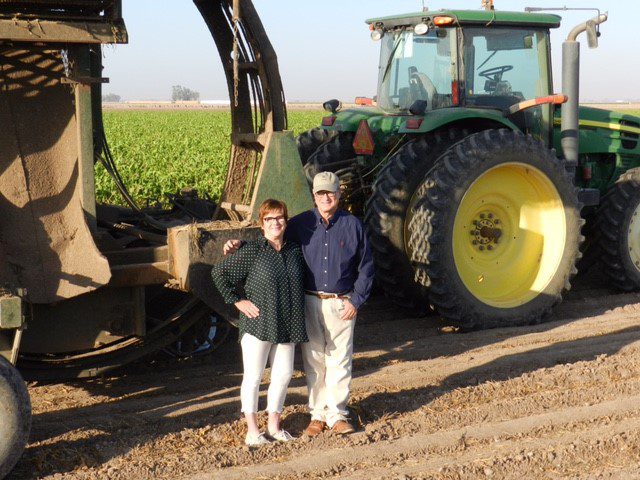If you’re familiar with sugar beets, you probably think of the northern United States where they are most commonly grown. However, California’s temperate climate also fosters wonderful sugar beets and grower Suzanne Rutherford was kind enough to share her sugar beet story.
Suzanne’s grandfather settled in the Imperial Valley in 1920. Both Suzanne and her husband, Curt, are 3rd generation farmers in this area. In the very early 1900s, the Imperial Valley was settled by some very industrious people who built a system of canals fed by the Colorado River to irrigate the land. Keep in mind that summer temperatures reach 115-120 degree days here. The irrigation turned the valley from desert to farm ground with very fertile soil.
In addition to sugar beets, the Rutherford’s have traditionally grown durum wheat for pasta, alfalfa, sudangrass, and produce. Unique to the California growers, sugar beet crops are grown over the mild winter and spring, then harvested in the summer season.
 Suzanne first got involved with the greater sugar community through the California Sugar Beet Grower Association back when California had many sugar beet farmers. At one point, sugar beets were grown all the way from Southern California to the northern border with Oregon. There were multiple processing facilities all over California to handle the volume of beets grown. Unfortunately, due to water supply and urban sprawl, most of the sugar beet growth and processing in California has ended. Now the Spreckels Sugar Factory in Brawley is the last one remaining.
Suzanne first got involved with the greater sugar community through the California Sugar Beet Grower Association back when California had many sugar beet farmers. At one point, sugar beets were grown all the way from Southern California to the northern border with Oregon. There were multiple processing facilities all over California to handle the volume of beets grown. Unfortunately, due to water supply and urban sprawl, most of the sugar beet growth and processing in California has ended. Now the Spreckels Sugar Factory in Brawley is the last one remaining.
Suzanne shared fond memories of all her kids working on the farm as soon as they were old enough to drive a tractor and during summer breaks. As she and her husband begin to think about retirement, they are leasing out their land to other farmers to continue the strong history of California agriculture. Now she is doing a lot of work off the farm spreading the word about the science of sugar beets, including the safety of GMOs. Suzanne serves as an American Sugarbeet Growers Association (ASGA) spokeswoman and speaks on the benefits of biotech and genetically modified plants for our environment and for farmers. Sugar beet farmers grow more beets on less acreage and use less water thanks to genetically modified seeds. The sustainability goes way beyond saving water and increasing soil health; they are also able to prevent weed growth and save hundreds of hours or weeding by hand.
Cultivating such a strong community and making so many friends is one of Suzanne’s favorite things about being a sugar beet farmer. She wants everyone to know that “sugar is a natural product from the earth. The people that grow the beets or the cane care very deeply about their environment, the soil and their future.” Farming is tough, but at the end of the day they’re happy to do it and she wouldn’t trade being a farmer for just about anything.
References:
Cover Photo: Suzanne and her husband, Curt
Body Photo: Suzanne with 2 of her grandchildren




Get Social with #MoreToSugar